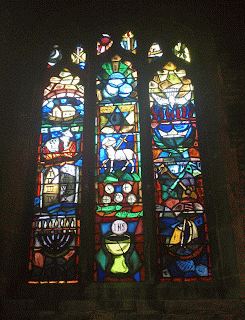First this window by Jean Barillet, son of Louis Barillet (see earlier blog post), the sun was blazing through the strong colours of these panels dedicated to St Crispin and St Crispinian, patron Saints of the boot and shoe making industry, making the figures vivid and intense.
Looking for information on Jean Barillet I came across this write up stored in The Universal Digital Library;
The young Parisian Stained Glass Artist Jean
Barillet
succeeded a few years ago his father Pierre
Barillet, a great
artist himself who lived his whole life among the
most brilliant
gathering of French painters such as Matisse,
Vlaminck,
Utrillo; and was the first to foresee the
tremendous possib-
ilities that modern Painting can bring to the art
of Stained Glass.
Jean Barillet carries on, in the studio built by
his father,
researches in the artistic and technical fields of
his activity.
He was the first to try out and expand the
fascinating
new process consisting of thick slabs of coloured
plate glass set
in cement, thus, curiously enough, coming back
through the
ages to the simplicity and the slightly primitive
means of
expressing their Faith of the middle-Ages old
Masters.
Recently, Jean Barillet contributed, with the
well-known
French painter Fernand Leger, huges pannels of
cement-set
glass meant for the experimental Church of
Audincourt; thus
placing Stained Glass at the Spearhead of
modernism.Jean Barillet (1912 - 1997) had an extensive and impressive career working in Basilicas, Cathedrals and Churches in many countries including the Cathedral of Notre Dame in Paris, The Cathedral of St Joseph in Hartford USA, Church of Audincourt (France) and many many more.
Evie Hone (1894 - 1955) was an Irish stained glass artist described by the Tate as 'an outstanding religious painter of modern Ireland and a stained glass artist of international stature'. In All Hallows she made the Alice Maud Middleton Memorial Window with ideas and symbolism based on the Creation.
Evie Hone created many stunning windows including 'My Four Fields Green' showing the 4 symbols of the provinces of Ireland and this work is now in Government Buildings, Office of the Taoiseach, Dublin and a huge and complex window in the chapel of Eton College, Berkshire.
John Piper another famous stained glass artist has three windows in this church; the Rose Window (which sadly I did not see - any photos appreciated!), the Constance Chapman Memorial Window and the Helen Wells Chapman Memorial Window, all three were executed by Patrick Reyntiens. The windows date from 1961 to 1969 and you can see how much his style developed in this period. The first of his windows was the Helen Wells Chapman Memorial Window 1961 below;
this is his later Constance Chapman Memorial Window from 1969 about which he said "It is what you make it to be";
John Piper with Patrick Reyntiens, created the windows at Coventry Cathedral, the chapel of Robinson College Cambridge and the Washington National Cathedral amongst many others. On this sunny day they proved their absolute skill in working colour, light, shape and form.
All Hallows Church is the oldest existing building in Wellingborough dating from c. 1160, you can find it on the Wellingborough Council Heritage Trail and there appear to be occasional tours of the stained glass advertised on the All Hallows Facebook page.










